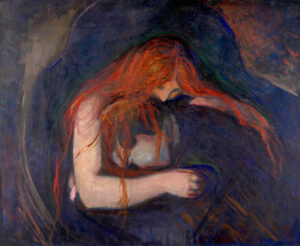1817, Sept. 20—A young doctor driving through a leafy park in Norfolk loses control of his horse-drawn gig and falls from the carriage either just before or after it strikes a tree. His injury is grievous, and although he’s carried to a nearby manor, he is not expected to live. Yet he does not die.
He languishes in bed for weeks, gradually learning to walk again, to speak again, to think straight. Quite the setback for someone who earned his medical doctorate at the age of 19 and once served as the personal attendant for Europe’s most famous poet, Lord Byron. Despite lingering cognitive problems, the doctor uses his convalescence to write. By winter he produces a thoughtful if strange piece: “An Essay Upon the Source of Positive Pleasure.”
Most essays present the disembodied voice of the author, but in the doctor’s essay most of the words are “the sentiments of another person,” a voice he says came to him in a dream. On one hand, this sounds very much like the experience of a deranged person. It’s also reminiscent of Samuel Taylor Coleridge’s claim that the complete text of “Kubla Khan” came to him in his sleep. Is the doctor addled by his injury? Is he slyly evoking the mysticism of the great poets of his day? And is the essay any good? There is a clear answer only for the last question: no, the essay is not good. It begins well in contemplation of the nature of pleasure, but the argument never really coheres.
 Strong openings and fizzled ends, brain injury and intellectual pretension, being at death’s door but also not—confusing paradox pervades John Polidori’s life. Or at least his life as it comes to us centuries later, when he’s simultaneously unknown but influential, a failure but also the author of “The Vampyre,” the progenitor of a literary trope that’s still alive and well (or should I say undead and well). He’s both galling and pitiful, Polidori; and if he’s unforgettable, it’s mostly because it’s hard to know what to think of him.
Strong openings and fizzled ends, brain injury and intellectual pretension, being at death’s door but also not—confusing paradox pervades John Polidori’s life. Or at least his life as it comes to us centuries later, when he’s simultaneously unknown but influential, a failure but also the author of “The Vampyre,” the progenitor of a literary trope that’s still alive and well (or should I say undead and well). He’s both galling and pitiful, Polidori; and if he’s unforgettable, it’s mostly because it’s hard to know what to think of him.
*
If you’ve never heard of John William Polidori, don’t feel too out of step. I didn’t know his name until a few months ago, when I read the diary entries and letters from guests of Lord Byron at Lake Geneva during the summer of 1816. Polidori’s name appears in those pages alongside the likes of Monk Lewis, Mary Shelley, Percy Shelley—all writers of notable Romantic or Gothic works that remain in print today.
There are some people who, in the company of genius, flourish and expand in surprising, collaborative ways. Everyone thinks bigger when such people are in the room. Polidori was not such a person. He was 21 at the time, and, no surprise, he was also haughty, needy, and both proud of his credentials and spoiling to prove his mettle. He brought plenty of grief upon himself by bickering with others and insisting he was their equal as a writer.
Earlier that year, Byron and his wife divorced in a spectacular manner; the reputational damage was such that his friends worried he might contemplate suicide. He needed fresh society and a change of scenery. And a minder. Polidori was hired to keep Byron safe in his travels abroad.
Unlike most people in Byron’s orbit, Polidori had neither title nor landed wealth. His father had a law degree but worked as a writer, teacher, and translator. His mother was a one-time governess. Polidori was their eldest son and they had great expectations for him. He earned his medical degree at a shockingly early age. But by law a doctor could not practice medicine in London until the age of 26. Thus it was that Polidori found himself hired as the personal physician to Byron and headed off on a Continental tour.
In a second stroke of good luck for our young doctor, Byron’s publisher agreed to pay £500 for a travel diary chronicling his time with the famously infamous poet. Yes, that’s right—without any real literary credentials, Polidori was offered more than a year’s wages for a tell-all on his patient’s antics; and this, apparently, with Byron’s assent. You can’t blame Polidori for feeling full of himself.
Polidori began his travel diary on April 24, 1816, when Byron and his party set out from London. In his first entry Polidori describes the Thames, fields of barley corn, the Canterbury cathedral: everything but the famous poet he was meant to watch. The second entry is more of the same until Polidori mentions that he shared a play he’d written with Byron, who read it aloud to the others. “I had to hear [my play] laughed at,” Polidori writes, adding that the laughter came “partly, I think, from the way in which it was read.”
Polidori goes pages and pages without another mention of his writing. Instead he makes observations on girls in wooden shoes, badly staged ballets, and the travails of carriage travel on cobbled streets. The group tours graves, churches, and the artistry of masters such as Vandyck, Reubens, and Napoleon. (The last of course was an artist of citadels, field houses, and navy ports.) The narrative perks up whenever Polidori quotes or alludes to Lord Byron. One gets the sense Polidori is less of a physician and more of a groupie—or, as Polidori puts it: “a tassel on the purse of merit.” In salons and at soirées everyone falls for Byron’s charms. Polidori makes perhaps the most poetic remark of his life when he compares himself standing beside Byron to “a star in the halo of the moon, invisible.”
In June, they spend whole days sailing Lake Geneva with the contrarian poet Percy Shelley, his teenaged paramour Mary Godwin, and Mary’s half-sister Clare Clairmont. Bad weather led to late nights indoors at Lord Byron’s lodgings, where they sat up till the small hours to debate science, alchemy, spirits, and all manner of divination. They read aloud from spooky books too, both for laughs and in dead earnest. Quite famously one night Byron proposed that they should each write a ghost story: naturally Polidori wrote something too.
 Byron penned a few pages on a supernatural theme and set the story aside, unfinished. Percy Shelley’s contribution to the contest—if he wrote anything—is lost. Mary, of course, began to compose what would become known as Frankenstein. And Polidori? He produced a tale that years later Mary would describe as “something about a keyhole and a woman with a skull for a head.” There is no precise record of how Polidori’s story was received, but we can surmise that it was not received well.
Byron penned a few pages on a supernatural theme and set the story aside, unfinished. Percy Shelley’s contribution to the contest—if he wrote anything—is lost. Mary, of course, began to compose what would become known as Frankenstein. And Polidori? He produced a tale that years later Mary would describe as “something about a keyhole and a woman with a skull for a head.” There is no precise record of how Polidori’s story was received, but we can surmise that it was not received well.
There’s more to say about this ghost story contest, but this is where Polidori’s diary goes silent. He drops off entries altogether for more than two months. When he resumes his entries again in September, with a breezy summary we learn that he has fallen out with Byron, the party at Lake Geneva has broken up, and he has struck out on his own in the Italian Alps. He is either too stubborn or too ashamed to return to England. He will make something of his time abroad, come what may.
Polidori kept his diary till the end of 1816, but in it he makes no further mention of the ghost contest or the story he wrote. Later, Polidori will claim that during this time he put his hands on Byron’s cast-off supernatural tale and for a lark he refashioned its corpus into something new, which he called “The Vampyre.” This is the tale that will (across oceans of time) launch a thousand vampiric imitations for the next two hundred years. Strangely, we have no record at all in Polidori’s personal journal for this, the most consequential composition of his life.
How ironic and sad would it be if this young man so desperate for literary glory didn’t recognize the moment when he did something worthy of posterity? As far as ironic stories go, it’s almost too sad to be true. Let me restate that more clearly: It’s probably not true. As with so much of Polidori’s life, if you look closer than the apparent surface of things, you discover something else altogether.
*
There’s a formula for this sort of essay, and I don’t know if I cribbed it from better essayists or if I arrived at it on my own. First, I present a vignette involving a writer, a slice of life, sweet as key lime pie; then I dig into the biographical facts and foibles of this person who has captured my fancy; finally, in the last section I get confessional, confiding in how this writer’s work resonated with me in the modern day—a sleight of hand meant to make you, the reader, vibrate with similar awe by the end of the piece.
John Polidori is different. His writing never resonated with me. He isn’t a great writer. He isn’t an underappreciated writer, either. If you ask me, he’s over-appreciated by the small cadre of people who know his name. He was an intellectual dilettante who made an outsized impact on the vampire genre after revising someone else’s original story. The fact that he still lives in our discourse two centuries later is shocking.
There were moments in the composition of this essay when I pushed back from the keyboard, rubbed my eyes, and thought, What am I hoping to find, again? Usually this occurred late at night. Almost always, for some reason, at the hour between 11 pm and midnight. The time when the quotidian demands on my life go quiet and I am alone with the literary aspirations that haunt me.
Often during these times I thought of my 11-year-old son. Many nights after I turn out the lamp beside his bed he asks me to stay with him. I sit for a little while, sometimes reading a book, sometimes dozing, sometimes adrift in thoughts. But always before long I get up. Sometimes he hears me, asks, “When will you go to bed, Papa?”
What he’s really saying is: Stay with me a little longer. Stay till I fall asleep. Sometimes I do. But I almost always have other things on my mind. Often I tell him that I will go to bed soon. But first I have some writing to do.
At moments like this, when I look at the words I’m wrestling with, like these words about the life of Polidori, I think: Why am I fighting so hard to put this together? Wouldn’t it be easier, might life not be sweeter, if I struggled less and appreciated the moment that I’m in a little more?
At some point, I realized that this is what I have in common with Polidori. This is what draws me back to him—not his writing, not his contribution to a particular genre, but his heedless ambition. Both of us are trapped in the paradox of literary aspiration. The need to put words into the world—but the need to absent yourself from the world in the process of finding said words. The only real difference between us is how far we’re each willing to go.
*
A year after he was sacked by Lord Byron, Polidori was back in England. There can be little doubt that he still smarted over his experience at Lake Geneva. Polidori was the kind of man who moves on only with great difficulty; his failures, and the men responsible for them, were always visible, always prodding.
He was still not old enough to practice medicine in London, so he opened a practice to treat the poor and sick at Norfolk. Using the skills he honed abroad in Europe, he began to make the rounds in society. He made the acquaintance (and probably took the fancy of) the young Harriet Martinaeu, a daughter of a leading Norwich family. Just 15 at the time, Harriet would go on to be a sociologist whose work caught the eye of the queen.
I believe at this moment Polidori was on the cusp of real happiness; that he could have found a satisfying niche in Norwich society. I can imagine an alternate universe where a) John Polidori lived a happy life, and b) no one ever read or appreciated his literary work. Unfortunately, if you’d told Polidori that b) was a precondition for a), I’m certain he’d reject the terms.
Then, the fateful Saturday afternoon arrived in late September: the out of control gig, the crash into a gnarled tree, the head injury so grave that a Catholic priest was summoned to offer last rites. Yet he did not die.

The essay that Polidori wrote during his recovery—that strange essay on the nature of pleasure—gains new significance in the full context of his life. Its main thesis—that pleasure is innate to the pleased, and is not bestowed by the pleasing agent—reads like an admonition he wants to give himself but can’t, a failed attempt to grapple with the good life that he can’t accept as good enough.
That winter he presented the essay at a meeting of the Norwich Philosophical Society. I imagine a dim room with mostly empty chairs and polite applause, and afterward plates of cold repaste and tepid words of praise. If he expected this essay to change his status as a writer, his expectations were not met. Once again, he had fallen short.
Imagine the state he was in—still hobbled by a brain injury, once again thwarted in literary ambition—when in early 1818 he encountered the notices for Frankenstein. A strange novel published by an anonymous author; a disturbing and macabre story about a monster created by a scientist in violation of all the laws of nature. Polidori might not have recognized the prose, as Mary Shelley wrote most of it after she left Lake Geneva. But certainly the book’s preface would have started him with this vignette:
“The season was cold and rainy, and in the evenings we crowded around a blazing wood fire, and occasionally amused ourselves with some German stories of ghosts, which happened to fall into our hands. These tales excited in us a playful desire of imitation. Two other friends (a tale from the pen of one of whom would be far more acceptable to the public than anything I can ever hope to produce) and myself agreed to write each a story founded on some supernatural occurrence.”
I can almost hear Polidori’s voice across the centuries, the words he could have whispered to himself as he looked up from the printed page of the volume that he held in his hand: Two other friends? Only two? Wasn’t I there? Didn’t I write a story, too?
*
One year after Frankenstein’s debut, a literary magazine called the New Monthly began promoting a new story from the esteemed Lord Byron, who was still abroad but whose celebrity remained in force. On the first of April, the publishers presented the text of “The Vampyre” along with an introduction that positioned the storythis as Lord Byron’s contribution to the famous ghost story session. The first print run sold out at once.
A friend sent Byron a copy and asked if he was the author. He responded with disdain: “Damn ‘The Vampire.’ What do I know of vampires?” Quickly, word got out that Byron was not the author. By the end of the month, the publishers were changing the type for the next printing. This wasn’t a book by Lord Byron, they admitted. It was an idea of Lord Byron’s but written down by someone else. Or, as one edition put it, “Related by Lord Byron to Dr. Polidori.”
For decades, literary historians presumed that Polidori wrote his vampire story at Lake Geneva or shortly afterward. The main source for this theory was Polidori himself: he wrote letters claiming this shortly after the story, letters that helped fuel the idea that somehow his work was attributed to the wrong man.
The tone of letters is unequivocal: “The Vampyre,” he writes, “is not Lord Byron’s but was written entirely by me at the request of a lady.” He demands a retraction. He demands his name be added as the true author. He seems genuine. Yet some parts of his story don’t add up. He claimed to have written the story and left it in the care of a certain lady. Which lady was it precisely? Why did she keep this story for two years then box up the materials and send them to London? As with all things Polidori, the closer you get, the more questions begin to emerge. The story he shaped from the damp clay of Byron’s ghost story became a publishing sensation, yes, that’s true. But this other narrative, the one that suggests Polidori had his story stolen and published without his consent? There are many reasons to believe that it’s not quite true.
Three years ago, the Italian scholar Fabio Camilletti used textual analysis to suggest the editor of The New Monthly and Polidori were in cahoots all along. The idea that the story was composed in Lake Geneva in 1816 at the request of some countess and then somehow found its way into an editor’s hands in late 1818 was mere marketing to drum up public interest.
 In a recent critical essay, the author Nick Groom scours letters and diaries from figures involved in the scandal and concludes that Polidori and the publishers likely colluded on a plan that went awry. Were they originally intending to credit Polidori more widely in the initial print run? Did Polidori just get greedy after he saw how quickly copies sold out and decide to demand a greater claim than they had originally planned? If they’re both liars, which liar decided to lie to the other liar first? Had Polidori been deluded from the start about what his role was in all this?
In a recent critical essay, the author Nick Groom scours letters and diaries from figures involved in the scandal and concludes that Polidori and the publishers likely colluded on a plan that went awry. Were they originally intending to credit Polidori more widely in the initial print run? Did Polidori just get greedy after he saw how quickly copies sold out and decide to demand a greater claim than they had originally planned? If they’re both liars, which liar decided to lie to the other liar first? Had Polidori been deluded from the start about what his role was in all this?
*
 In her book on Frankenstein’s composition, Oxford historian Daisy Hay says that Polidori’s story has a “preoccupation with otherness: with figures who sit outside the confines of society and who threaten disruption through their very being.” She’s right about the story’s preoccupations; and she’s equally right about the man.
In her book on Frankenstein’s composition, Oxford historian Daisy Hay says that Polidori’s story has a “preoccupation with otherness: with figures who sit outside the confines of society and who threaten disruption through their very being.” She’s right about the story’s preoccupations; and she’s equally right about the man.
A full view of Polidori the man requires a trick of indirect observation, like watching a partial solar eclipse. I remember gathering outside as a school child during one such eclipse. Don’t look directly up, my teacher admonished us. You’ll ruin your eyes! Instead, we put our heads in a box with a tiny pinhole and plate where light that shone through made the shape of a crescent sun. As if the sun was being secretly eaten—a perfect metaphor for the life of a writer.
It’s easy to feel galled by Polidori’s naked ambition and miss the raw humanity depicted in his diary entries from his time with Byron. He is clumsy. He breaks a glass that costs three francs. He accidentally drops a book on a girl’s head because he’s trying to look into her eyes. He clogs the diary with long lists of the friends he makes in upper social circles and his notable flirtations. He had frequent scuffles: a fistfight with six men on a wagon, a dust-up with an apothecary, an arrest and expulsion from Milan for accosting an Italian officer. In the days after parting with Byron, he wandered the Alps all the way to Germany, where he was depressed by the particular darkness that settles over someone in a place where no one speaks his languages.
Think of what it would be like for this man to fail again and again in his quest for validation by the literary society he wanted so badly to impress: the society that laughed at his plays and ghost-story ideas, that overlooked him and flocked instead to talented but cynical men like Lord Byron. And then, with “The Vampyre,” to come so close as to have his hand on the halter of acclaim, only to watch it bolt free? It broke him. Two years later and he was dead, a suicide. The Vampyre—as it were—killed him.
In the inquest after his death, one of the witnesses attested to the last time he saw Polidori as such: “On Thursday at dinner he spoke in half sentences; the conversation was on politics and a future state. He appeared to be deranged in his mind, and his countenance was haggard.” Not long after, Polidori died by drinking prussic acid in his room. He was found in his last agonies, but in a real sense he was alone when he died.
In an alternate reality, Polidori might have stuck it out in Norwich and married Harriet Martineau and been happy. His brain injury was not the end of his chance at happiness, but it was the beginning of his end. Harriet wrote this of his nearly fatal incident: “If he had (happily) died then, he would have remained a hero in our imaginations. The few following years (which were very possibly all the wilder for that concussion of the brain) disabused everybody of all expectation of good from him.”
I imagine that she watched in despair when Polidori spiraled in jealousy after Frankenstein debuted. She would have witnessed his clandestine Vampyre campaign, when he and the editor of the New Monthly put together their scheme for presenting Polidori’s work as the detritus of Lord Byron. And after he realized that this scheme had failed, she would have seen how the light went out of him. Why couldn’t he be happy with what he had?
Once again I look up from these words. Once again it is late, 11:14 pm, an hour of the supernatural, of witching monsters, of warnings that masquerade as tall tales. It’s hard to look at all of Polidori’s struggles in total. All his maddening behaviors. His refusal to be satisfied as a doctor and his ceaseless desire to be seen as a writer. The more I press into it, the more familiar it looks. Isn’t it all rather familiar? Isn’t his life similar in more and more ways to the life that all writers end up maintaining? The need to reconcile being a parent and a writer, or a writer and a spouse, or a writer and whatever else you need to do to pay the landlord, the grocer, the power company?
It’s easy to say that from Polidori we should learn a lesson. But it’s hard to follow the lesson’s path. He suffered his entire life from this need to craft words and stories that other people would admire. What if this impulse, the need to succeed through storytelling, were something he could have cut out? Would he have been able to feel satisfied with the parts of his life that were a success? Maybe. But then who would he be? Certainly not the same person.
We arrive now at the place where I should but cannot judge this man Polidori. Because while the circumstances and the era are different, if I were to judge him, I would need to judge myself too. Because what—of anything I’ve ever written in two decades as a mature writer, what is worth more than my children? My wife? My friends? Nothing is the only correct answer. Yet I retreat time and again to work on essays like this one. I have to. Never mind that the exchange rate is all wrong.
I should go wake my son. I should sit on his bed and plan our day tomorrow, a day when we’re both free, a Saturday. Shall we watch the sunset on Long Island Sound in all its garish brights and golds? Or play basketball in the park? Or chat about all the plans he has for the video games that preoccupy his mind? I could wake him and we could talk about all these things right now. But we won’t. Instead, I’ll sit here for another hour thinking more about someone who’s been dead for two hundred years. I’ll keep writing and erasing words, one letter at a time, telling my own literary ghost story to anyone who will listen.























































